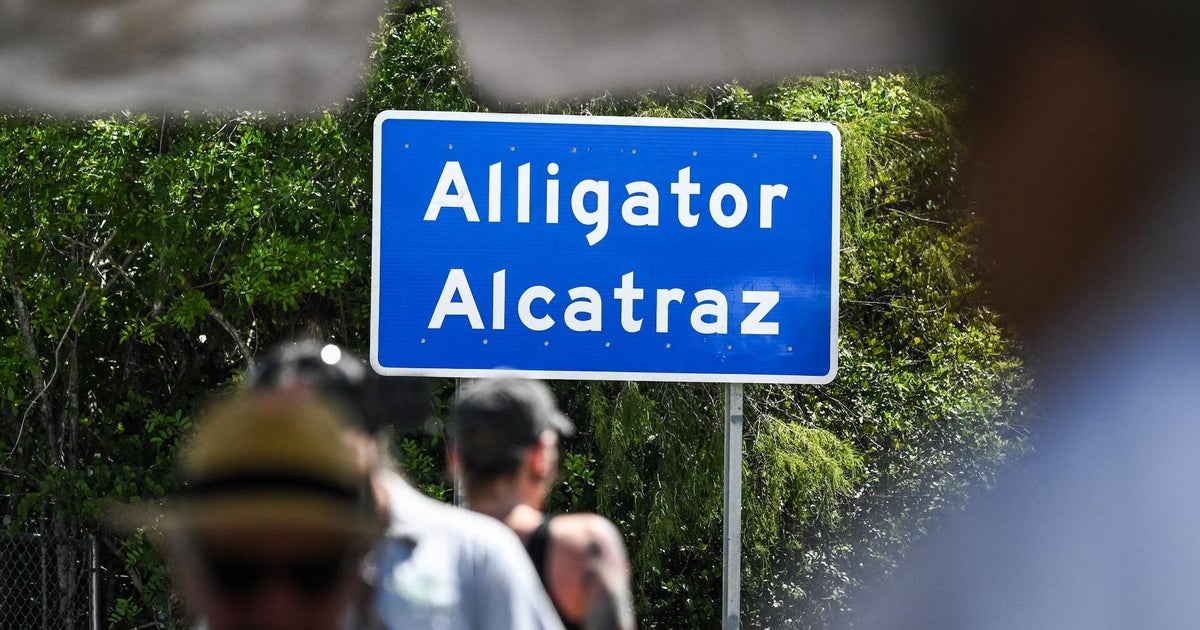In a recent development that has sparked considerable debate and controversy, a federal appeals court in Washington issued a halt on a lower court’s ruling concerning the dismantling of parts of an immigration detention site known as “Alligator Alcatraz.” This site, located in the sensitive ecosystem of the Florida Everglades, has become a focal point in debates over immigration enforcement and environmental preservation. The decision by a panel of judges on the U.S. Court of Appeals for the 11th Circuit came with a 2-1 majority, asserting that the facility can remain operational while the pertinent lawsuit—which challenges the detention center on environmental grounds—progresses through the legal system.
The backdrop of this dispute involves a series of decisions by government authorities that underscore the polarizing views on immigration enforcement in the United States. The Department of Homeland Security had begun transferring detainees away from the facility late last month, in response to the initial court directive. However, state officials indicated a readiness to ramp up operations at Alligator Alcatraz should the appellate court overturn the lower court’s decision. This complex legal maneuvering began after U.S. District Judge Kathleen Williams ordered the state of Florida and the federal government to cease expansion efforts at the site and commence the removal of infrastructure such as fences, lights, and generators within a two-month framework. Judge Williams sided with environmental groups and a Native American tribe, who contended that the detention center was established without adequate consideration of federal environmental reviews, which they argued were essential given the site’s sensitive location.
The appellate ruling, authored by Judge Barbara Lagoa and supported by Judge Elizabeth Branch—both appointees during President Trump’s first term—posited that the state and federal officials are likely to demonstrate that Alligator Alcatraz does not fall under the National Environmental Policy Act (NEPA), as it is a state-operated facility which has not received federal reimbursements for operational costs. Judge Adalberto Jordan, an appointee of President Obama, dissented from this majority opinion, underscoring the prevailing legal and environmental tensions surrounding the facility.
The Department of Homeland Security welcomed the appellate court’s decision, framing it as a victory for law enforcement’s capacity to manage immigration efficiently and safely. A statement released by the department critiqued the lawsuit as being less about environmental concerns and more about hindering the government’s ability to deport individuals deemed a threat to community safety. On the political front, Florida Governor Ron DeSantis voiced his approval of the ruling through a video posted on social media, emphasizing the state’s commitment to leading in immigration enforcement under his administration.
Conversely, environmental and advocacy groups such as Friends of the Everglades and the Center for Biological Diversity expressed disappointment, though they remained optimistic about the case’s ultimate resolution in their favor. Leaders from these groups highlighted their ongoing commitment to the legal battle, stressing the importance of protecting the Everglades and opposing what they view as an environmentally and ethically problematic facility. They underscored the emotional and ecological stakes of the continued operation of Alligator Alcatraz, located on an abandoned airstrip, which they believe poses significant risks to the surrounding environment and its diverse habitats.
The facility, part of a broader effort by the past administration to increase the capacity for immigration detention as arrests surged, has been touted by proponents as a cost-effective measure that enhances public safety by deterring undocumented immigration. However, opponents have condemned the inhumane conditions within the facility and the opaque processes surrounding its establishment and operation. The legal battles thus not only encapsulate the ongoing national debate over immigration policy but also reflect deeper divides over state versus federal authority, environmental stewardship, and human rights.
Alligator Alcatraz continues to stand as a contentious symbol within these multifaceted issues. Previous lawsuits have raised concerns about the detainees’ limited access to legal representation and questioned the state’s authority to operate such a facility under national legal frameworks. As the case proceeds, it remains a critical nexus of legal interpretations, environmental advocacy, and immigration policy, highlighting the broader national conflicts and the local impacts of such a detention center on the ecological treasure that is the Florida Everglades.









